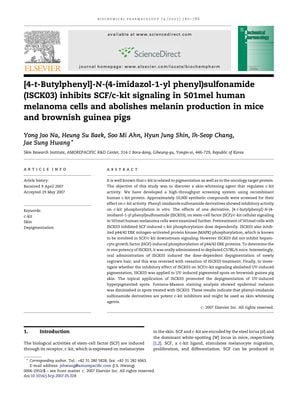[4-t-Butylphenyl]-N-(4-imidazol-1-yl phenyl)sulfonamide (ISCK03) Inhibits SCF/c-kit Signaling in 501mel Human Melanoma Cells and Abolishes Melanin Production in Mice and Brownish Guinea Pigs
July 2007
in “
Biochemical Pharmacology
”
ISCK03 SCF/c-kit signaling melanin production 501mel human melanoma cells p44/42 ERK MAPK phosphorylation depigmentation topical application UV-induced hyperpigmentation Fontana-Masson staining skin-whitening agents c-kit activity stem cell factor signaling melanin melanoma cells ERK MAPK phosphorylation topical treatment UV hyperpigmentation skin-whitening c-kit

TLDR ISCK03 stops melanin production in human melanoma cells and lightens skin color in mice and guinea pigs.
The study identified [4-t-Butylphenyl]-N-(4-imidazol-1-yl phenyl)sulfonamide (ISCK03) as a potent inhibitor of SCF/c-kit signaling, which is involved in melanin production. ISCK03 was shown to inhibit SCF-induced c-kit phosphorylation in 501mel human melanoma cells without affecting cell proliferation. It also inhibited p44/42 ERK MAPK phosphorylation, part of the downstream signaling of SCF/c-kit. In vivo experiments demonstrated that oral administration of ISCK03 to C57BL/6 mice led to dose-dependent depigmentation of regrown hair, which was reversible after stopping the treatment. Topical application of ISCK03 on brownish guinea pigs reduced UV-induced hyperpigmentation, as confirmed by Fontana-Masson staining analysis. These findings suggest that ISCK03 and similar compounds could be used as skin-whitening agents by targeting c-kit activity. The study was funded by the Korea Health 21 R&D Project, Ministry of Health & Welfare, Republic of Korea.

